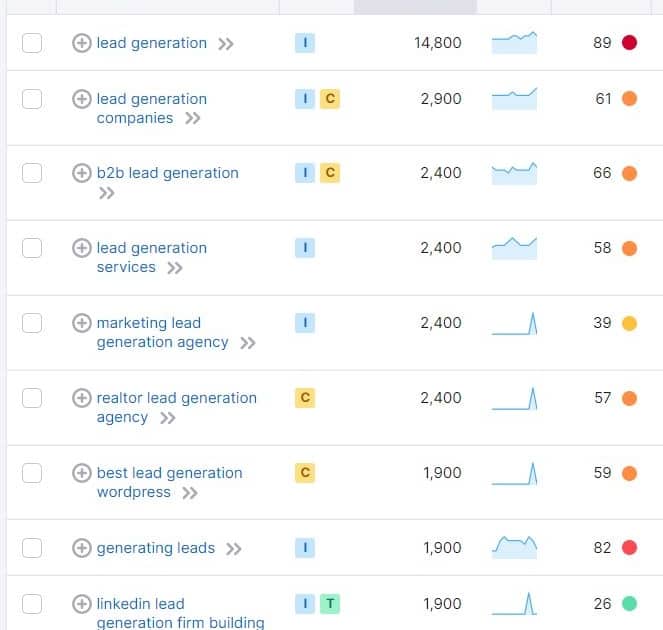
Keywords, often referred to as “key phrases” or “search queries,” are words or phrases that people type into search engines to find information about a specific product, service, or topic.
Keywords are essential for search engine optimization (SEO) and pay-per-click (PPC) ads. Without keywords, people wouldn’t be able to find your company website or landing page to get the answers they’re looking for.
Keywords can be a specific term or phrase depending on what you hope to achieve by using them. Word-based keywords are referred to as “short tail,” and phrase keywords are referred to as “long tail.” Ideally, you’d want to use long tail keywords because people typically look for specific information about what they type in the search bar.
Here’s an example around the keyword “lead generation” to consider:
While you could just use the short-tail term “lead generation,” it’s a broad approach because you don’t know what specifically people are looking for when searching for lead generation. Given the intent of the keyword, these individuals are just looking for more information about the word.
However, let’s say that a person wants to find a lead generation company to work with for their business growth efforts. In that case, they would search for the long-tail phrase of “lead generation companies” with the intent of making a purchase. Using a long-tail approach allows you to bring in more potential buyers who are ready to convert.
These words or phrases must be integrated throughout your copy without “keyword stuffing,” which is a fancy phrase for typing in the focus keyword over and over in hopes of it landing as the first result of the search engine results page (SERP). Search engines like Google and Bing penalize copy with keyword stuffing because it doesn’t support the user experience in any way, shape, or form.
Now that you have good understanding of what keywords are, let’s cover the following topics:
Why Are Keywords Important?
Keywords are a crucial part of your digital marketing strategy because they’re the words that people are typing into search engines. These keywords should be used to help you develop page or blog topics that individuals are actively looking for online.
If a person searches for a specific topic surrounding that word or phrase, and that topic exists on your website, search engines will recognize your company website as a good source of information. Once a user has entered your website from that keyword search, you’d like them to continue navigating your site. And if they find value in the information you have to give, you’re more likely to convert them into leads.
Any person browsing the internet can become a marketing qualified lead through a variety of avenues. If the goal of your website is to generate revenue, you probably want the lead to schedule a sales meeting with a sales or account executive. Many people aren’t ready to become leads after the first time they visit your website, though. When they want to learn more but aren’t ready to make a purchase, they can become a lead by subscribing to your company newsletter or entering their information to access an exclusive guide.
How To Use Keywords for SEO vs. PPC
While keywords play a similar role in SEO and PPC, they’re used a little differently between the two approaches.
SEO Keywords
SEO is a digital marketing practice that requires time and patience because bringing in website traffic and leads doesn’t just happen overnight. When building an SEO keyword strategy, it’s important to establish your business as a thought leader in the industry.
To present your business as a reliable source, your marketing team must write and publish content that provides value to the reader. This content can be informational, navigational, or transactional, and this depends on your intent of the piece and the intent of the keyword. We’ll jump into keyword intent later in this blog.
Initially, SEO keywords are meant for educating interested users rather than making a sale. A good SEO keyword strategy should prioritize answering any questions a user has about a product, service, or topic related to your industry. If they see the value your company has to offer them, they can continue their journey through your website and potentially become a lead through one of your conversion pages.
PPC Keywords
PPC keyword research is vital for making sure your ad reaches the top of the SERP for the right users. PPC keywords should be specific and ideally long tail. If you use a broad PPC keyword target, you risk generating the wrong leads.
For example, let’s say you’re a roofing company that distributes a PPC ad for “leak repair.” To get the best leads through your PPC campaign, you must target a specific, long-tail keyword like “roofing leak repair” so you don’t get leads looking for plumbing leak repairs. Long-tail keywords for PPC ads reduce bounce rates, resulting in a costly ad price. Additionally, they boost overall conversion rates from users into leads.
Want to learn more about SEO and PPC? Check out our blog here to gain in-depth insight into their differences and why both are essential for a successful digital marketing strategy.
Tools You Can Use To Find Keywords for SEO
There are a lot of SEO keyword research tools on the market you can use to find keywords for an accelerated inbound lead generation strategy. Here are some of the top keyword tools that high-performing marketing teams use to reach their target audience:
- SEMrush
- AHrefs
- Moz
- Hubspot
- Google Keyword Planner
Qualities To Look for When Choosing Keywords
While having relevant keywords in your copy is vital for attracting the right people, there are other aspects of it to consider. As you look at your list of keywords, it’s also important to pay attention to:
Keyword Difficulty
Keyword difficulty is a metric determining how likely a page or blog will rank for that specific keyword. Keyword difficulty is rated on a scale from 0–100, with 100 being the most difficult to rank unless your website is identified as a highly credible source.
As a small to medium-sized business, you should be targeting keywords that have difficulty between 20 to 50 because you’re positioning yourself alongside competitors. Keyword difficulty is an essential quality when selecting keywords because it can help you decide if it’s worth your time and money.
Keyword Volume
Keyword volume (also known as “search volume”) is the number of searches the keyword has gotten within a particular time frame (often monthly searches). Keyword volume goes hand in hand with keyword difficulty because, more often than not, the higher the volume, the higher the difficulty.
While many businesses aim to target high-volume keywords, it’s not always in their best interest because there’s little possibility that it would rank high on the SERP—so it doesn’t bring in interested users. As you consider your keyword choices, look at the search volume and explore how it compares to the difficulty and the intent of the piece you want to write. This increases the likelihood of ranking higher and bringing more traffic to your website.
Keyword Intent
Keyword intent is a person’s reason for looking up a keyword or phrase in a search engine. Overall, there are three reasons people type a keyword into a search bar:
- Information: They want an immediate answer to a question they have
- Navigation: They want to learn more about a product, service, or topic
- Transaction: They’re looking to buy something to solve a problem they’re having
In the past, keyword difficulty and volume played a significant part in SEO. While they’re still important, the keyword intent must match your goal of the page or blog. Without the proper keyword intent, you risk pushing away users because your content doesn’t fit their needs.
Keyword Cost-Per-Click
Keyword cost-per-click is the average keyword cost for a PPC ad. However, this cost can vary depending on the success of your PPC ad. For instance, if many people find your ad valuable and convert themselves into leads, the cost-per-click is reduced. However, if the ad sees a high bounce rate with few conversions, the cost-per-click rises. To keep costs minimal, it’s vital that the landing page matches the intent of the keyword and provides value to the user.
Key Takeaways
Keywords are the backbone of a successful SEO strategy and PPC campaign. Without them, there’s little to no way you can bring users to your business and generate inbound leads. They provide significant benefits to both your company and users, positioning your business as a resourceful thought leader in the industry.
While keywords themselves are important, it’s equally as important to consider the intent of the keyword. Putting thought and consideration into your keyword usage is essential for bringing the right people to your website to ensure you’re presenting them with information that’s relevant to them and their needs.
At Abstrakt Marketing Group, our digital strategists are experts in conducting keyword research and writing SEO copy that brings users to websites and converts them into leads. If you need a boost with your keyword research strategy, contact the marketing experts at Abstrakt!



